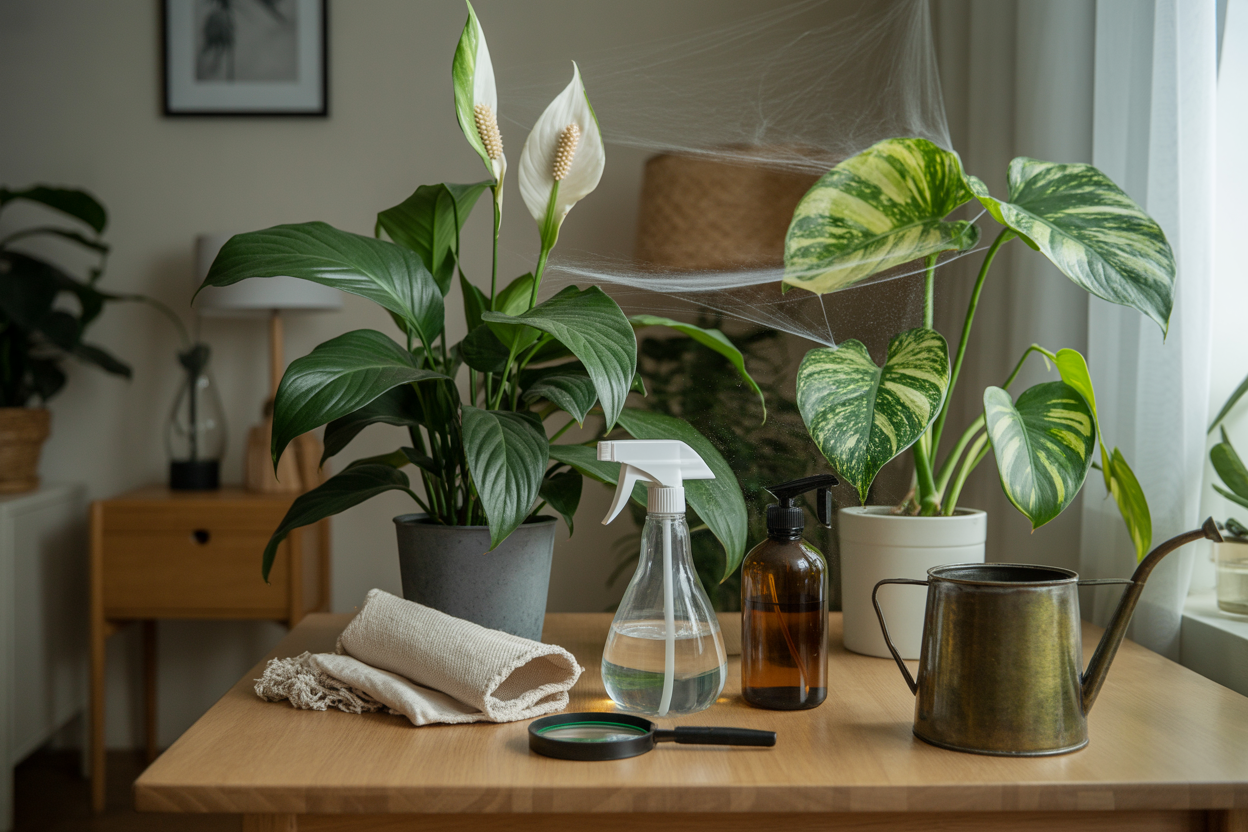
What to Do About Spider Mites in Houseplants?
Spider mites are a common problem for houseplants and can quickly damage your beloved greenery. These small, spider-like insects suck moisture from plants, leading to discolored leaves, stunted growth, and even plant death if left untreated. Fortunately, you can effectively combat and prevent spider mites with the right approach. In this article, we answer the question of what to do about spider mites in houseplants? and share practical steps to keep your plants healthy.
What Are Spider Mites?
Spider mites are small pests, often no bigger than a pinhead, that feed on the sap of houseplants. They thrive in warm, dry conditions, such as heated homes in the winter. Plants such as the peace lily, ficus, monstera, and calathea are often susceptible to spider mites.
Signs of spider mites:
- Fine, white or gray dots on leaves (especially on the underside).
- Yellow or brown spots and discolored leaves.
- Fine webs, especially under leaves or between stems.
- General growth retardation or wilted plants.
Quick action is crucial to prevent further damage. Let's look at how to recognize and deal with spider mites.

How to Identify Spider Mites
Spider mites can be hard to see with the naked eye, but the symptoms are obvious. Check your plants regularly, especially the undersides of leaves, where spider mites often gather.
How to check:
- Use a magnifying glass to spot small, moving dots (spider mites).
- Look for fine webs, which resemble spider webs but are much smaller.
- Check for discolored or spotted leaves, especially on plants in dry, warm areas.
Dry air and high temperatures (above 20°C) promote spider mites, so rooms with low humidity are particularly susceptible.
Treatment of Spider Mites on Houseplants
If you have discovered spider mites, act quickly to save your plants. Here are the steps to effectively combat spider mites:
- Isolation : Isolate the affected plant to prevent spread to other plants.
- Cleaning : Rinse the leaves with lukewarm water in the shower or wipe them clean with a damp cloth to remove as much spider mites as possible.
- Natural remedies : Make a solution of water with a few drops of mild dishwashing liquid and spray the plant. Alternative: use neem oil, a natural repellent for spider mites.
- Chemical control : Use insecticidal soap or an anti-spider product (available at garden centers). Follow the instructions carefully to avoid damage to the plant.
- Repetition : Treat the plant weekly, at least 2-3 times, to eliminate all life stages of spider mites (eggs, larvae, adults).
Prevention of Spider Mites in Houseplants
Prevention is better than cure. With these tips you can keep spider mites at bay:
- Increase humidity : Spider mites like dry air. Use a humidifier, mist leaves regularly, or place a bowl of water and pebbles next to your plants.
- Regular Inspection : Check your plants weekly for early signs of spider mites, especially in winter.
- Healthy plants : Give your plants enough water and nutrients to strengthen their resistance.
- Ventilation : Provide good air circulation, but avoid drafts that can stress plants.
Common Mistakes to Avoid
Avoid these mistakes to effectively protect your plants:
- Late intervention : Spider mites spread quickly, so don't wait at the first signs.
- Excessive use of chemicals : Too much pesticide can damage your plants. Use them sparingly and follow the directions.
- Neglecting other plants : Spider mites can jump to nearby plants, so check everything nearby.

Benefits of a Spider Mite Free Plant Collection
A spider mite-free plant collection offers many advantages:
- Healthy plants : Without spider mites, your plants grow better and look better.
- Longer lifespan : Controlling pests prevents plant weakening and death.
- Relaxing atmosphere : Healthy plants contribute to a relaxed and green living environment.
Conclusion
With the right approach, you can effectively combat and prevent spider mites in your houseplants. By inspecting your plants, cleaning them, and increasing the humidity, you can keep spider mites under control. Whether you opt for natural remedies such as neem oil or an insecticidal soap, quick action is key. With these tips, your houseplant will remain spider mite-free and you will enjoy a healthy, green collection.
Ready to protect your plants? Start inspecting your houseplants today and take action against spider mites!
